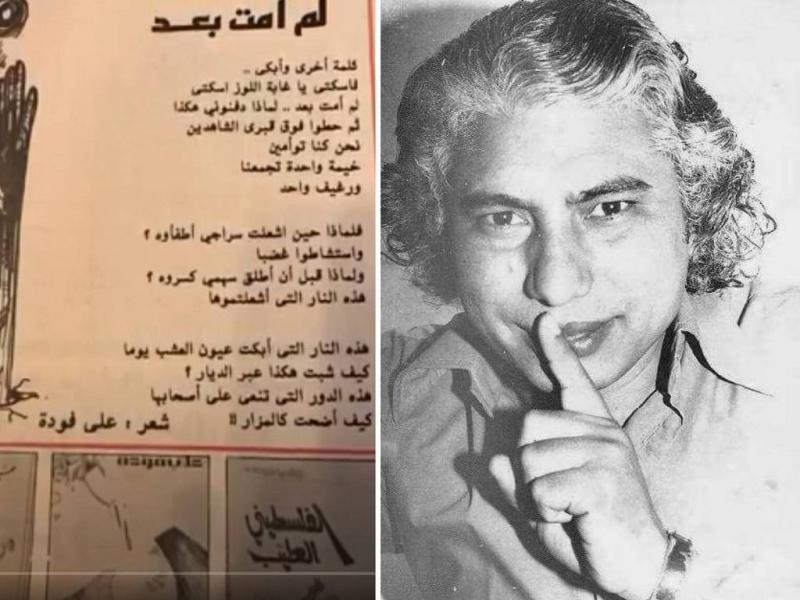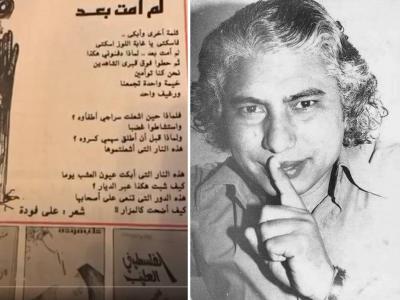He was nicknamed "the Poet of the Sidewalk," "the Poet of the Vagabonds," "the Newspaper Seller," "the Gypsy," "Oruwa ibn al-Ward al-Falastini," "the Mayakovsky of Palestine," and "the Martyr Poet."
He was the poet who departed early.. he was a revolution in himself and an institution on his own, writing, printing, and distributing the magazine "Al-Raseef" or "Raseef 81," which he founded with his colleague, poet Rasmi Abu Ali. He published and distributed it by hand himself.. until it was said that shrapnel hit him before his martyrdom on the shores of Beirut, where he was distributing the magazine to fighters, which had become a daily during the Israeli invasion of Beirut in 1982. He was known by many names that reflected his clear revolutionary and resistant personality, as evident as the title of his first collection of poetry "Palestinian as the Sword's Edge."
Who is our poet? Ali Youssef Ahmed Foda was born in the village of Qinnair in the Haifa district in 1946, and amid the Nakba, his family emigrated when he was two years old to the West Bank, specifically to the Janzour refugee camp near Jenin, and then the residents of Janzour camp were transferred to the Nour Shams camp in Tulkarm. His cultural education began in front of their house in the camp, when the box of wonder would come, and children would pay a piastre, or half a piastre, to watch films about Antar and Abla, and the Zahir al-‘Umar, among others.. After that, he read Pablo Neruda, Federico García Lorca, Fadwa Tuqan, Ghassan Kanafani, Kamal Nasser, and others.. He experienced orphanhood at the age of seven when his mother passed away.. His father married another woman, which led Ali to withdraw from family life. He obtained a high school diploma in 1964. He moved to Amman to complete his education at a teacher training institute and graduated in 1966. He worked as a teacher at a school in Naour, north of Amman, from 1966 until 1970, then moved to teach in Jabal al-Nazif, Ashrafiyeh, Al-Taj, and Al-Qala’.. There he witnessed the events of Black September in 1970.
After a while, the national rise in Kuwait attracted Palestinian intellectuals, including Ghassan Kanafani and Naji al-Ali, leading to poet Ali Foda who moved to Kuwait in 1975 to join his peers there, but he did not find his opportunity and did not blend into the cultural community, so he opted for another exile to Baghdad, settling in Iraq in 1976 and 1977, until resistance escalated in southern Lebanon, and he received news from Beirut about the revolutionary Palestinian cultural community there.. He chose yet again a new exile: Beirut (after the Nakba, the refugee camps of Janzour, Nour Shams, and Jenin, followed by Irbid, Amman, Kuwait, and Baghdad), arriving there in 1977, establishing himself and working in the cultural realm, and at the magazine "Palestine Revolution," being an active intellectual in the field.. He did not wish to be office-bound.. He was a committed poet concerned with his people's concerns, integrally connected to the popular forces calling for revolution, resistance, and liberation.
He emerged in Beirut as one of the poets of the second generation of resistance, having founded with his friends the newspaper "Raseef 81," to represent the culture of the margin and difference far from the official institution. He distributed it himself, as one of his friends recalled when visiting him in the Ras Nabeh axis in Beirut, holding a fighter's gun in his right hand, and in the other hand, the "Raseef" magazine distributing it to Palestinian and Lebanese fighters.
In the summer of 1977, artist Marcel Khalife met him and sought permission to sing a verse from the poem "The Anger, the Panther" from his collection "The Howl of the Wolf." They agreed on a passage:
I have chosen you, O my homeland... with love and volition
I have chosen you, O my homeland... secretly and publicly
Everyone thought the song was from a poem by Mahmoud Darwish until Marcel Khalife sang it at the Arab University of Beirut, and when applause rose from the audience, Khalife left the stage and took Ali Foda with him to announce that he was the owner of this text, thus amplifying Foda's fame even more.
His Martyrdom
In mid-August 1982, during the peak of Israeli bombardment of Beirut from air, land, and sea, Ali Foda was distributing his newspaper to fighters in the Ain al-Mreisseh area on the beach of Beirut when a shell fell on him, injuring him severely, and he later succumbed to his wounds days after, becoming one of the few who read the elegies written about him before his death, as he announced his martyrdom while he was alive. The newspaper "Al-Ma'raka" released by the Palestinian Writers and Journalists Union, as recounted by its editor-in-chief, Ezzedine al-Mansour, published those elegies written by writers and poets in its editorial council and the union, reaching him the next day. (It is worth mentioning that three Palestinian newspapers were published during the siege of Beirut: Al-Ma'raka, Raseef, and Al-Mitaras, which were handwritten and distributed at the fronts).
The Lebanese writer Elias Khoury mentioned this in his novel "The Gate of the Sun": "I remember he came wounded to the hospital.. The newspapers that were published in Beirut during the siege published long elegies for him, and when the poet woke from his death, he read the elegies and felt an indescribable happiness. His health condition was hopeless, for he was injured in his spine and his left lung was ruptured, but he lived for two days, and that was enough for him to read everything written about him. He said he was happy and that he no longer cared about death, for he learned that day the meaning of life through love made of words."
His Works
- Palestinian as the Sword's Edge, Poetry, 1969.
- Poems from the Eyes of a Woman, Poetry, 1973.
- The Howl of the Wolf, Poetry, 1977.
- The Gypsy, Poetry, 1981.
- Secret Publications of the Grass, Poetry, 1982.
- The Good Palestinian, Novel, 1979.
- Gallows Wood, Novel, 1983.




